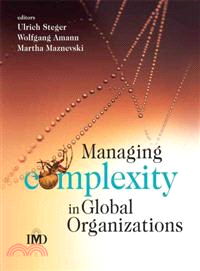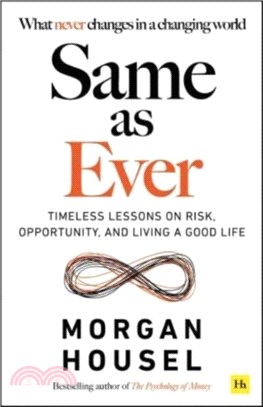Managing Complexity In Global Organizations
商品資訊
ISBN13:9780470510728
出版社:John Wiley & Sons Inc
作者:Steger
出版日:2007/03/30
裝訂/頁數:平裝/312頁
商品簡介
作者簡介
目次
相關商品
商品簡介
This book delivers new IMD insights on an emerging challenge - how to deal with overwhelming complexity. Global organizations face a complex decision-making environment. On one side, diversity of cultures, customers, competitors and regulations creates complexity; on the other, competitive pressures cause expanding countries to extract more synergies across products and regions. In such a climate, a new way of thinking, acting and organizing is needed beyond the familiar ‘control’ mindset.
Drawing together insights from across the expert faculty, Managing Complexity in the Global Organization presents IMD’s framework on how to understand complexity and its four key drivers (diversity; interdependence; ambiguity and flux), along with solutions on specific issues in a variety of functions, industries and markets. The focus is on providing practical solutions based on real-life examples.
Drawing together insights from across the expert faculty, Managing Complexity in the Global Organization presents IMD’s framework on how to understand complexity and its four key drivers (diversity; interdependence; ambiguity and flux), along with solutions on specific issues in a variety of functions, industries and markets. The focus is on providing practical solutions based on real-life examples.
作者簡介
Ulrich Steger holds the Alcan Chair of Environmental Management at IMD. Switzerland, and is Director of the school's research project on Corporate Sustainability Management. He also directs major partnership programs including DaimlerChrysler and Allianz, and is or has been on the boards of several major organizations – including Volkswagen, where he was in charge of worldwide environmental strategy. Prior to becoming involved in management education he was Minister of Economics and Technology in the German state of Hesse, with particular responsibility for transport, traffic and energy.
Wolfgang Amann is a Fellow in Strategic Direction and International Business at Henley Management Centre, UK. He joined Henley from IMD, and has also been visiting fellow at the Wharton School and Indian Institute of Management. Prior to pursuing his PhD he worked for DaimlerChrysler and subsequently in management consulting. He has directed, delivered and contributed to open and in-company programs and courses on strategy, internationalization and governance in the US, Europe, China and India. His recent case study series on Hindustan Lever in India won the 2006 Oikos sustainability case competition.
IMD is one of the worlds leading business schools, with a particular focus on developing state-of-the-art concepts for the experienced manager.
Wolfgang Amann is a Fellow in Strategic Direction and International Business at Henley Management Centre, UK. He joined Henley from IMD, and has also been visiting fellow at the Wharton School and Indian Institute of Management. Prior to pursuing his PhD he worked for DaimlerChrysler and subsequently in management consulting. He has directed, delivered and contributed to open and in-company programs and courses on strategy, internationalization and governance in the US, Europe, China and India. His recent case study series on Hindustan Lever in India won the 2006 Oikos sustainability case competition.
IMD is one of the worlds leading business schools, with a particular focus on developing state-of-the-art concepts for the experienced manager.
目次
Contributors.
Foreword by the Editors.
Acknowledgements.
Part I Conceptual Framework and Trends on the Macro-level.
Chapter 1 Managing Complexity in Global Organizations as the Meta-challenge (Martha Maznevski, Ulrich Steger, and Wolfgang Amann).
Chapter 2 The Complexity of Managing Corporate Social Responsibility in Multinationals (Michael Yaziji and Karin Oppegaard).
Chapter 3 Opportunities and Threats in the Global Political and Economic Environment (Jean-Pierre Lehmann).
Part II Impact of Changes in the Competitive Landscape and Business Models on Complexity in Selected Industries.
Chapter 4 The Need to Look at Complexity at the Industry Level (Ulrich Steger and Wolfgang Amann).
Chapter 5 Shipping Organizations – The Ultimate Global Players (Peter Lorange).
Chapter 6 Managing Complexity Caused by Industry Dilemmas: The Case of the Automotive Industry (Ulrich Steger).
Chapter 7 Managing Complexity with an Electronic Manufacturing Services Supplier (Wolfgang Amann, Carlos Cordon, Ralf W. Seifert, and Thomas E. Vollmann).
Chapter 8 Managing Complexity in the Financial Services Industry (Arturo Bris).
Part III Solutions for Managing Complexity on the Functional Level.
Chapter 9 Breaking Down Complexity Management to the Functional Level (Wolfgang Amann and Ulrich Steger).
Chapter 10 Complexity in Global Business Strategies: The Cumulative Impact of the Crisis of Choices (Jean-Pierre Jeannet).
Chapter 11 Various Dimensions of Complexity in Effectively Managing the Innovation Process – The Role of China (Georges Haour).
Chapter 12 Managing Complexity with Management Diversity (Martha Maznevski and Karsten Jonsen).
Chapter 13 The Role of Information in Creating Value Efficiently (Don Marchand and Amy Hykes).
Chapter 14 Dealing with Complexity by Managing Knowledge-Based Competence of the Organization (Kazuo Ichijo).
Chapter 15 Managing Complexity in Marketing and Supply Chains (Ralf W. Seifert and Wolfgang Amann).
Part IV Additional Complexity Challenges.
Chapter 16 The Price Tag of Ignoring Complexity in the Globalization Process (Wolfgang Amann).
Chapter 17 Managing Complexity in Mergers and Alliances (Ulrich Steger).
Chapter 18 Managing Complexity: The Family Business Experience (John Ward).
Chapter 19 The Future of Managing Complexity (Wolfgang Amann, Ulrich Steger, and Martha Maznevski).
Index.
Foreword by the Editors.
Acknowledgements.
Part I Conceptual Framework and Trends on the Macro-level.
Chapter 1 Managing Complexity in Global Organizations as the Meta-challenge (Martha Maznevski, Ulrich Steger, and Wolfgang Amann).
Chapter 2 The Complexity of Managing Corporate Social Responsibility in Multinationals (Michael Yaziji and Karin Oppegaard).
Chapter 3 Opportunities and Threats in the Global Political and Economic Environment (Jean-Pierre Lehmann).
Part II Impact of Changes in the Competitive Landscape and Business Models on Complexity in Selected Industries.
Chapter 4 The Need to Look at Complexity at the Industry Level (Ulrich Steger and Wolfgang Amann).
Chapter 5 Shipping Organizations – The Ultimate Global Players (Peter Lorange).
Chapter 6 Managing Complexity Caused by Industry Dilemmas: The Case of the Automotive Industry (Ulrich Steger).
Chapter 7 Managing Complexity with an Electronic Manufacturing Services Supplier (Wolfgang Amann, Carlos Cordon, Ralf W. Seifert, and Thomas E. Vollmann).
Chapter 8 Managing Complexity in the Financial Services Industry (Arturo Bris).
Part III Solutions for Managing Complexity on the Functional Level.
Chapter 9 Breaking Down Complexity Management to the Functional Level (Wolfgang Amann and Ulrich Steger).
Chapter 10 Complexity in Global Business Strategies: The Cumulative Impact of the Crisis of Choices (Jean-Pierre Jeannet).
Chapter 11 Various Dimensions of Complexity in Effectively Managing the Innovation Process – The Role of China (Georges Haour).
Chapter 12 Managing Complexity with Management Diversity (Martha Maznevski and Karsten Jonsen).
Chapter 13 The Role of Information in Creating Value Efficiently (Don Marchand and Amy Hykes).
Chapter 14 Dealing with Complexity by Managing Knowledge-Based Competence of the Organization (Kazuo Ichijo).
Chapter 15 Managing Complexity in Marketing and Supply Chains (Ralf W. Seifert and Wolfgang Amann).
Part IV Additional Complexity Challenges.
Chapter 16 The Price Tag of Ignoring Complexity in the Globalization Process (Wolfgang Amann).
Chapter 17 Managing Complexity in Mergers and Alliances (Ulrich Steger).
Chapter 18 Managing Complexity: The Family Business Experience (John Ward).
Chapter 19 The Future of Managing Complexity (Wolfgang Amann, Ulrich Steger, and Martha Maznevski).
Index.
主題書展
更多
主題書展
更多書展今日66折
您曾經瀏覽過的商品
購物須知
外文書商品之書封,為出版社提供之樣本。實際出貨商品,以出版社所提供之現有版本為主。部份書籍,因出版社供應狀況特殊,匯率將依實際狀況做調整。
無庫存之商品,在您完成訂單程序之後,將以空運的方式為你下單調貨。為了縮短等待的時間,建議您將外文書與其他商品分開下單,以獲得最快的取貨速度,平均調貨時間為1~2個月。
為了保護您的權益,「三民網路書店」提供會員七日商品鑑賞期(收到商品為起始日)。
若要辦理退貨,請在商品鑑賞期內寄回,且商品必須是全新狀態與完整包裝(商品、附件、發票、隨貨贈品等)否則恕不接受退貨。





















![Wicked [Movie Tie-In]:魔法壞女巫電影原著](https://cdnec.sanmin.com.tw/product_images/006/006285284.jpg)


